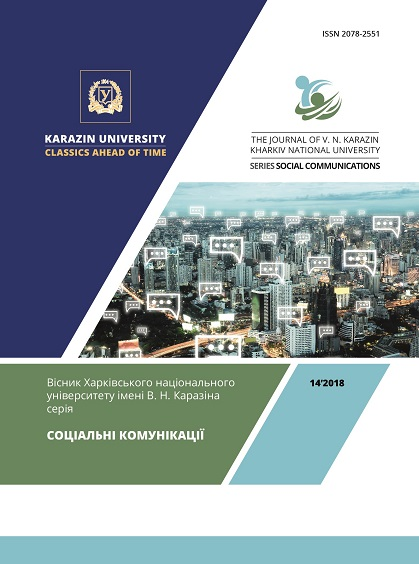Fake journalism in Ukraine as an element of modern show-civilization
Abstract
The paper describes the concept of «fake news» in comparison with «false news». It was considered the interpretation of «show-civilization», the understanding of which is closely related to the philosophical concepts of G. Debord's «society of the spectacle» and J. Baudrillard's «the consumer society». Fake messages in politics are analyzed, including during the presidential elections in Ukraine (2019). The emphasis was placed on fakes distributed on Facebook social network to create and replicate the mystifications about the presidential candidates. The paper contains an analysis of experimental studies in Ukraine related with the creation of fakes. One of the experiments of the Regional Press Development Institute (2018) was outlined in details, when a fake press release about the danger of ball lightning had been sent out to media editorships of the southern regions of Ukraine. The peculiarities of the fake message creation technology have been revealed and the reaction of the Ukrainian media has been traced. The essence of fake is disclosed as a contemporary antytrend in journalism in connection with the activity of world fact-checking resources, including Ukrainian ones. It is proved that fakes in the media can be not only in the format of news information, but also in messages that arise as a result. The paper emphasizes that «the plausible journalism», «journalism of views» and «journalism of impressions» are coming to replace «the factual journalism», «pseudo-journalism», «journalism of views» and «journalism of impressions» come to replace «fact journalism», and public opinion is shaped not only by facts but also by the post-truth, in which the emotional prevails over rational. As a result, we can say that the fake as a significant element of modern show-civilization is taking new forms and formats now. Accordingly, there is a need for expert researches and further development of the fact-checking, which can become one of the strategic directions of journalism.
Downloads
References
Baudrillard J. (2006). Obshhestvo potreblenija. Ego mify i struktury (E. A. Samarskaja per. s fr., poslesl. i primech.) Moskva : Kulturnaja revoljucija; Respublika. 269 p.
Gorokhovsky O. M. (2017). Faktchek yak trend rozsliduvan: mozhlyvosti ta perspektyvy. Dnipro : Lira. 133 p.
Debor G. (2000). Obshhestvo spektaklja (S. Ofertas, M. Jakubovich per. s fr.; B. Skuratov red.; A. Kefal poslesl). Moskva : Logos. 184 p.
Ilchenko S. N. (2016). Fejkovaja zhurnalistika kak jelement sovremennoj shou-civilizacii // Izvestija Uralskogo federalnogo universiteta. Ser. 1, Problemy obrazovanija, nauki i kultury. V. 22. № 3 (153). Pp. 14–18.
Ilchenko S. N. (2012). Shou-civilizacija: realnost sovremennoj medijnoj praktiki // Vestnik Sankt-peterburgskogo universiteta. Ser. 9: Filologija. Vostokovedenie. Zhurnalistika № 1. Pp. 227–230.
Kicza M. O. (2016). Fejkova informaciya v ukrayinskyh socialnyh media: ponyattya, vydy, vplyv na audytoriyu // Naukovi zapysky [Ukrayinskoyi akademiyi drukarstva]. No. 1. Pp. 281–287.
Peredvyborni fejky v ukrayinskomu Facebook: golovna mishen – Zelenskyj. (2019). Retrieved from: https://www.dw.com/uk/передвиборні-фейки-в-українському-facebook-головна-мішень-зеленський/a-47962432 (accessed 26 April 2019).
Pocheptsov G. (2018). Pochepcov G. Fejkov mnogo, teorij fejkov eshhe bolshe. Retrieved from: https://ms.detector.media/trends/1411978127/feykov_mnogo_teoriy_feykov_esche_bolshe/ (accessed 26 April 2019).
Romanyuk A. Yak sotni media v gonytvi za kulovymy blyskavkamy zapustyly fejk. Retrieved from: https://detector.media/infospace/article/140132/2018-08-14-yak-sotni-media-v-gonitvi-za-kulovimi-bliskavkami-zapustili-feik/ (accessed 26 April 2019).
Nimmo B. (2015) Anatomy of an Info-War: How Russia’s Propaganda Machine Works, and How to Counter It. Retrieved from: https://www.stopfake.org/en/anatomy-of-an-info-war-how-russia-s-propaganda-machine-works-and-how-to-counter-it/ (accessed 26 April 2019).




